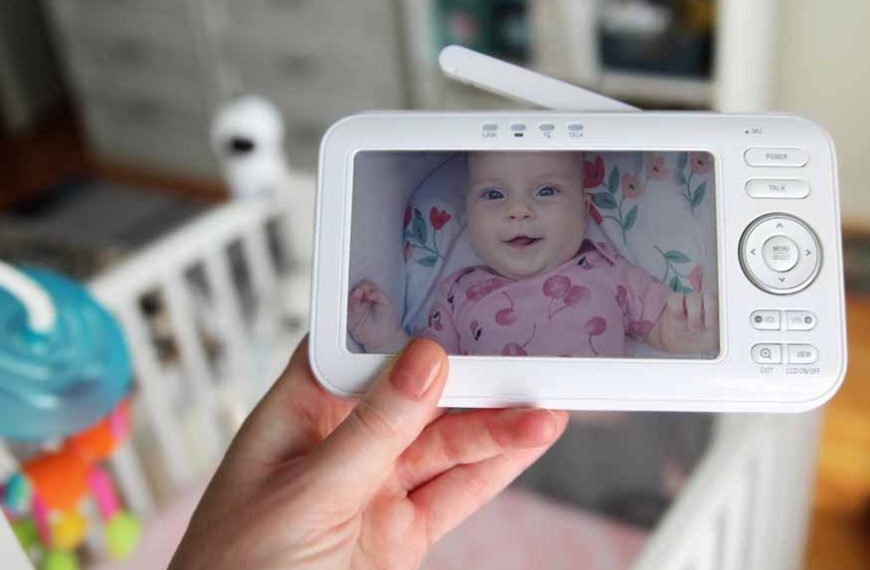Navigating the delicate ballet of parenthood involves a continuous pursuit of ensuring the safety and well-being of your cherished little one. In this intricate dance, where every step carries profound significance, technology emerges as a partner, offering an array of tools to assist in the guardianship journey. Among these tools, baby monitors stand out as a notable inclusion, acting as the vigilant eyes and ears that bridge the physical gap between parents and their infants. As we immerse ourselves in the digital age, the exploration of the advantages and drawbacks of baby monitors becomes imperative, shedding light on their role in the intricate tapestry of parenting and providing a nuanced understanding of whether they are an essential companion on this journey.
Understanding the Basics: How Do Baby Monitors Work?
This ingenious mechanism at the heart of baby monitors exemplifies the seamless integration of simplicity and efficiency in modern parenting tools. The basic architecture consists of a transmitter stationed in the baby’s room and a corresponding receiver carried or placed near the parents. This straightforward setup utilizes radio frequencies, providing a reliable channel for the transmission of audio signals, allowing parents to hear every coo or cry from their little one. In certain models, the visual element is introduced, incorporating video signals to offer an additional layer of observation. An evolution in this technology is the integration of Wi-Fi capabilities in advanced models, enabling remote monitoring through smartphones. This progression not only enhances accessibility but also aligns with the contemporary lifestyle, where connectivity and convenience are paramount. As we marvel at the simplicity of this mechanism, it becomes apparent that its brilliance lies in its ability to seamlessly blend age-old parenting concerns with cutting-edge technology.
Advantages:
- Peace of Mind for Parents
- Early Detection of Issues
- Enhanced Sleep Quality
Baby monitors offer a sense of reassurance to parents, allowing them to keep a vigilant eye and ear on their infants even when not physically present in the nursery. This peace of mind is invaluable, especially during the night or when occupied with household chores.
By picking up on subtle sounds like a rustling blanket or a soft whimper, baby monitors enable parents to detect potential issues promptly. This early awareness facilitates timely intervention, addressing concerns before they escalate.
For sleep-deprived parents, baby monitors can be a lifeline. The ability to monitor the baby without constantly entering the room allows for more restful sleep, contributing to better overall well-being.
Drawbacks:
- False Alarms
- Privacy Concerns
One drawback of baby monitors is the occurrence of false alarms. Motion sensors may be triggered by normal movements, causing unnecessary anxiety for parents. This flaw highlights the importance of choosing a monitor with adjustable sensitivity.
With the rise of smart baby monitors connected to the internet, there is a growing concern about privacy. Hacking incidents have raised questions about the security of these devices, urging parents to prioritize robust cybersecurity features.
What Is a Baby Monitor Used For?
The primary function of a baby monitor is to bridge the physical gap between parents and infants, offering a continuous means of observation and communication. Let’s explore the specific use cases that make baby monitors an indispensable tool for many parents.
Advantages:
- Remote Monitoring
- Facilitating Sleep Training
Baby monitors empower parents to monitor their child from a distance, fostering independence for both parents and infants. This is particularly beneficial during nap times or when the baby is playing in a separate room.
Baby monitors aid in sleep training by allowing parents to observe their child’s sleep patterns and responses. This insight is crucial for implementing effective sleep training strategies, leading to more structured and restful nights for both parents and infants.
Drawbacks:
- Dependency and Overmonitoring
- Limited Scope
A potential drawback is the risk of overmonitoring. Constantly checking the monitor may lead to heightened anxiety and an over-reliance on technology. Striking a balance between vigilant observation and trusting parental instincts is essential.
While baby monitors excel in providing auditory and visual cues, they have limitations. They cannot replace the nuanced understanding that comes from direct physical interaction. Parents should be cautious not to substitute screen time for genuine bonding.
Is a Baby Monitor Necessary?
The necessity of a baby monitor varies from family to family, depending on individual circumstances, parenting philosophies, and the layout of the living space. Let’s explore situations where a baby monitor is deemed essential and when it might be considered optional.
Advantages:
- Multitasking Made Easier
- Parental Flexibility
For parents juggling various responsibilities, such as working from home or managing household chores, a baby monitor proves indispensable. It enables multitasking without compromising the child’s safety and well-being.
Baby monitors foster parental flexibility, allowing caregivers to maintain an active lifestyle while staying connected to their child. Whether in the garden, home office, or attending to other children, parents can remain attentive to the needs of their infant.
Drawbacks:
- Small Living Spaces
- Highly Attentive Parents
In smaller homes or apartments where parents can quickly reach the baby’s room, the necessity of a baby monitor might be diminished. In such cases, direct proximity may render the constant use of a monitor redundant.
Parents who are naturally attuned to their child’s needs may find that a baby monitor adds an extra layer of vigilance that they deem unnecessary. The decision to use a monitor should align with the comfort and confidence levels of the parents.
How to Choose a Baby Monitor?
Selecting the right baby monitor is pivotal in ensuring a seamless and secure experience. With a myriad of options available, parents should consider specific factors to meet their unique requirements.
Advantages:
- Consider Range and Signal Strength
- Evaluate Additional Features
Assessing the range and signal strength of a baby monitor is crucial, especially in larger homes. Opting for a model with extended range ensures uninterrupted monitoring, even if parents are on different floors or in distant areas of the house.
Advanced baby monitors come equipped with a range of features, from temperature sensors to lullabies. Assessing which additional features align with your needs can enhance the overall utility and value of the monitor.
Drawbacks:
- Cost Considerations
- Security Features
Some feature-rich baby monitors come with a higher price tag. Parents should balance their budget constraints with the desired functionalities, ensuring they invest in a monitor that meets their essential requirements without unnecessary frills.
Given the increasing connectivity of baby monitors to the internet, prioritizing security features is imperative. Encryption protocols and secure login credentials help safeguard against unauthorized access, protecting the privacy of your family.
In the contemporary landscape of parenting, where the demands and dynamics have evolved, the advent of technology becomes a significant enabler for caregivers. Baby monitors, in particular, symbolize a technological embrace that aligns seamlessly with the timeless concerns of ensuring a child’s safety and well-being.
Embrace parenthood with confidence and nurture your child’s early years with EuroKids. Our holistic approach to early childhood education focuses on creating a supportive and stimulating environment for your little one. Visit EuroKids to explore our range of educational programs designed to foster the overall development of your child. Because every step in their journey deserves the best support.















